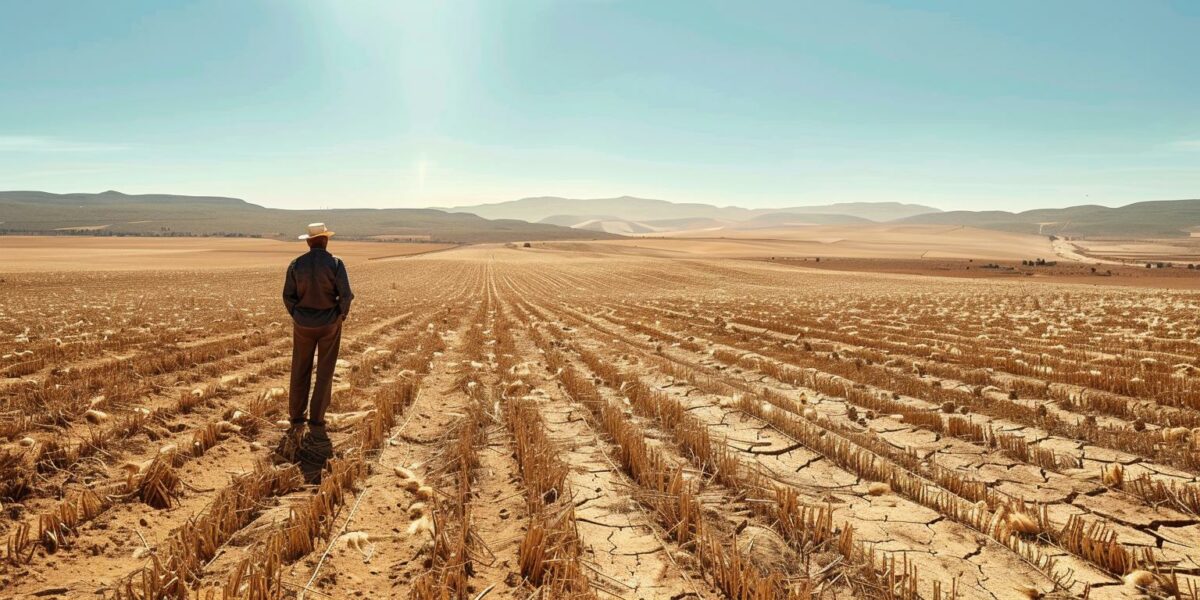The Impact of Climate Change on Moroccan Agriculture
Moroccan wheat fields, once lush and bountiful, are now struggling under the weight of a relentless six-year drought. This severe weather pattern has significantly affected the nation’s agricultural output, jeopardizing the livelihoods of cereal farmers and placing additional strain on the country’s food security.
The agricultural sector, which heavily relies on predictable weather patterns, has seen a drastic reduction in both crop volume and acreage. Farmers are facing unemployment, and Morocco is increasingly dependent on imports and government subsidies to keep staple food prices stable for the average consumer.
Al Housni Belhoussni, a small-scale farmer near Kenitra, reminisces about the past when wheat was abundant. He highlights the stark contrast to the present, where drought has severely reduced harvests over the past several years, impacting many farmers across the globe who are battling a hotter and drier climate.
The situation in Morocco is reflective of a broader global trend. As climate change exacerbates drought conditions, regions like North Africa, which are highly vulnerable, see diminishing yields of key cereal crops such as wheat, rice, maize, and barley. This reduction threatens to disrupt food supplies worldwide.
Economic and Social Ramifications
The drought’s impact on Morocco is profound, especially since cereals comprise the bulk of the country’s cultivated land and agriculture employs a significant portion of the rural population. The resulting economic shifts are reshaping the nation’s landscape, forcing some farmers to leave fields fallow and others to contend with reduced productivity.
In response to the dwindling water resources, the Moroccan government has implemented water use restrictions. Urban and rural areas alike face these limitations, with public baths, car washes, and farms now subject to rationing. These measures are essential to conserving the limited water supply.
Abdelkrim Naaman of Nalsya notes that late autumn rains delayed the agricultural season, with only spring rains in March providing some relief. His organization has been crucial in advising farmers on seeding and irrigation practices to mitigate the effects of drought.
The Ministry of Agriculture projects a wheat harvest of around 3.4 million tons this year, a stark drop from last year’s already low yield of 6.1 million tons. The seeded land has also reduced dramatically, further highlighting the severity of the crisis.
Strategies and Solutions for Farmers
To support struggling farmers, various strategies and solutions are being explored. These include:
- Adopting drought-resistant crop varieties
- Implementing advanced irrigation techniques
- Developing sustainable water management practices
These measures aim to help farmers adapt to the changing climate and maintain their livelihoods. However, the effectiveness of these initiatives will depend on widespread adoption and continued support from both the government and agricultural organizations.
Driss Aissaoui, an analyst and former member of the Agriculture Ministry, emphasizes that the current situation qualifies as a crisis. He stresses the need for increased imports to compensate for the shortfalls in domestic production, underscoring the structural nature of drought in Morocco.
The government must continue to subsidize prices to ensure that essential food items remain affordable for households and livestock farmers. This reliance on imports, however, is not a sustainable long-term solution, especially with primary suppliers like France facing their own decreasing harvests.
Rachid Benali, the chairman of COMADER, echoes these concerns, pointing out that Morocco’s reliance on imports has made it the sixth-largest wheat importer globally. The intersection of climate change and agricultural dependency poses a significant challenge for the nation.
Looking Ahead: Adapting to a New Reality
As Morocco grapples with the ongoing drought, it is clear that climate change has become a pressing issue. The nation’s experience serves as a warning to other regions facing similar threats. Proactive measures and innovative solutions are crucial to adapting to this new reality.
The future of Moroccan agriculture will depend on the ability to adapt to changing environmental conditions. Investments in sustainable practices and technologies will be key to ensuring food security and economic stability for the country’s rural population.
Despite the challenges, there is hope. By embracing new methods and prioritizing sustainability, Morocco can build a resilient agricultural sector that can withstand the pressures of climate change and continue to provide for its people.
The story of Morocco’s farmers is emblematic of a global struggle. As climate change continues to reshape our world, the resilience and adaptability of those on the front lines will determine the future of our food supply and our planet.



NoraDelta
Great article! We need more discussions on climate change’s impact on food security. 😊
ella_shadowdancer2
Yikes, that’s a massive drop in wheat production. How are the local communities coping with this?
hunter6
What role do international organizations play in mitigating such agricultural crises?
julian
Someone should seriously look into more sustainable farming practices. The current model clearly isn’t working.
jade
Oh no, this sounds terrible! Are there any success stories of farmers adapting to these conditions?
lauren
It’s sad to see how climate change is affecting agriculture. Morocco’s wheat crisis is just the tip of the iceberg.
David
Does anyone know if there’s a way to help these farmers directly?
ellie7
Thank you for shedding light on this! We need more awareness about these critical issues. 🌍
Henry
Wow, this is really concerning! What initiatives are being taken globally to combat such issues?